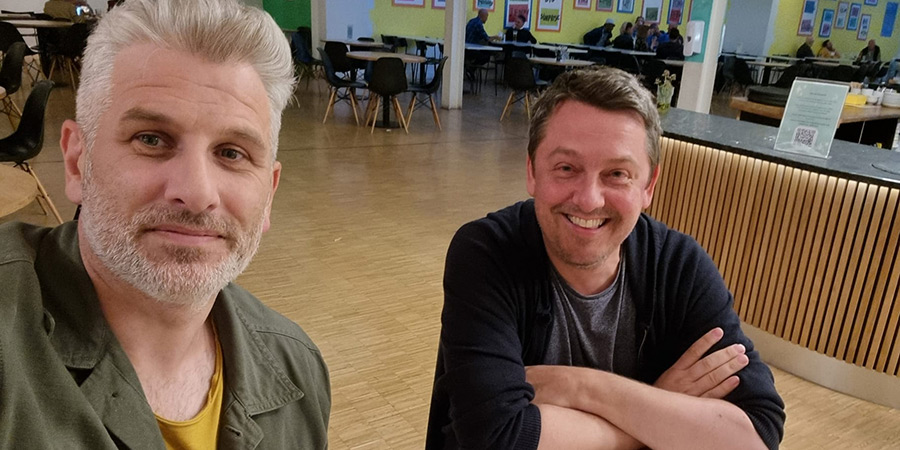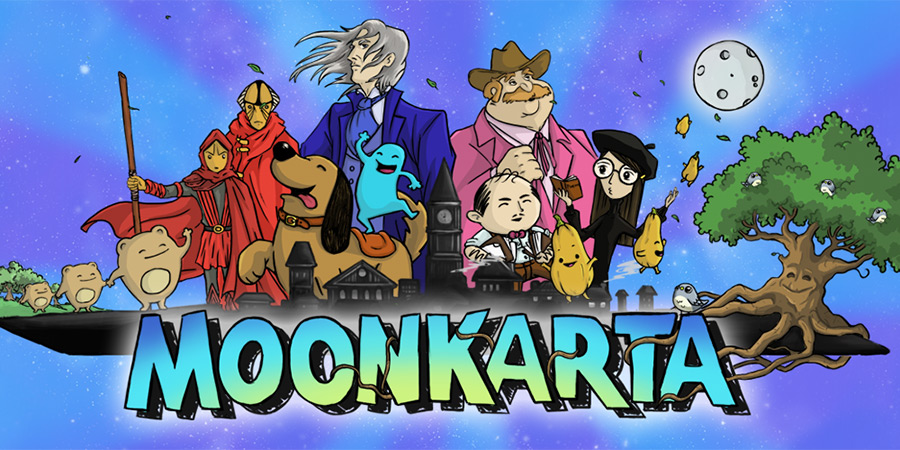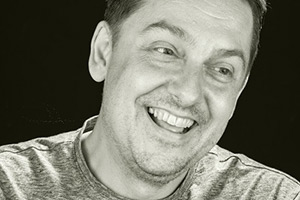How we write the fictional comedy podcast Moonkarta

As podcasts go, Moonkarta is an unusual beast.
For one, it's a presenter-less podcast, and one that really fizzes along; a funny fictional adventure, and a story populated by a host of characters in an entirely made-up world.
Secondly, it is cinematic in its soundscape, relying entirely on sound to make the audio experience as visual as possible, thus bringing Moonkarta and its inhabitants to life. Without a presenter or live discussions, as a work of fiction the audio has to work really hard to communicate story, action and character.
Thirdly, despite its geographical scope - which sees our characters journeying over land and sea, across deserts to ancient cities; and its cast of dozens, who argue with each other, sing together, cut each other off in their dialogue, often comprising of half-finished sentences, and asides; despite this, and the fact that it boasts an original soundtrack, Moonkarta is performed, recorded and edited by just one man in a garden shed! That man is veteran mimic and comedy actor Terry Mynott, whose incredible performance has been described by the Radio Times as 'reminiscent of Rik Mayall'.
So what do I do? I'm the co-writer! And that's it. Just the two of us. Col and Terry. Terry and Col. We are the team. No budget. No offices or state-of-the-art recording hub. The very definition of independent, Moonkarta is a DIY project from end to end, but listening to it, you would never know.

The idea
Terry and I met on Twitter.
We decided to meet for a coffee and a creative chat.
In that first meeting we clicked. By the end of it, within just a couple of hours, we had written the bare bones of a story that, when read back, read like a fever dream: a land with an ancient port town and a great tree Karta that has grown from a seed that was delivered via a meteorite that struck the land, that is connected to the balance of all things. An emerging cast of characters. A little blue guy called Splott who would be our Han Solo; funny, cheeky and a bit gobby. A terrible poet called Jansey Beebop who could return home if only she could prove herself to be a successful wordsmith to her parents. A librarian who would act as our storyteller/narrator. A brash, clumsy town mayor and his assistant Lugvurt. A Sassy Lighthouse Keeper. A family of moonbears who live in the Forbidden Forest that release butternut babies into the sky once a year. A land of great astronomers that protect the world by watching the stars. Mythology, folklore; a town, a land, a world and a universe.
I couldn't wait for our second meeting.
The writing and production

That was almost a year and ten episodes ago, and we have spent that time focusing on all the good stuff that makes fiction work. Story, narrative, plot, pacing, point of view, characterisation, contrast, conflict, structure. For us, writing is the key. We spent eight months writing before we recorded a single second of audio. For us, the writing is the stepping stone to everything that follows. Not only that, but, as you can imagine, writing sessions are hilarious!
We write with an eye on both the potential and the limitations of the recording and editing software, in this case Cakewalk by Bandlab, which is free, and the availability of the soundscapes we envisage are needed in the production.
How do you represent words, action and atmospheres on a page with sound alone? Whilst Terry uses Freesound which is also free as the name suggests, it is still be tricky to convey say, character Splott dropping a feather on the ground without him having to say 'Oh look! I've dropped a feather on the ground!' We are careful not to make the story's exposition quite so blunt just because it is audio, and so we have to be creative in how we make the leap from page to production.
If you have ever edited anything you will know of the wormholes you can find yourself down. I mean, that time Terry spent three hours trying to find the right seagull sound! If you see him, don't mention it!
Here's a clip of Terry Mynott and his studio set up. Here he describes the editing software, how it looks and the resulting sound:
See Tweet
Every one of our characters has a back story and a narrative arc. In our writing sessions, we focus intensely on their journeys and the unfolding of an adventure that, to date, we are confident is good for at least three series. Narrative threads that emerge in Series 1, we know, will not show themselves until the second or third. When we write, we refer to the map of a world that we have designed, and we take our characters to those places, populating them with ancient cultures, mythologies and belief systems, and we ask ourselves what they are doing there and how they will interact with that place.
From the start, the aim has always been to write something that will appeal to children and parents alike. The podcast was described by Radio Times as 'something of an achievement - a comic drama that doesn't patronise children or irritate adults'. Some listeners have described how they enjoy the podcast with their children, and how they laugh along together which is an absolute delight to us. Parents tell us that they are badgered by their children for the next episode, and the next, and the next...
We write at Chapter Arts Centre in Cardiff. We don't have an office or studio. We write in the open. At a table laden with coffee mugs and ginger beer bottles. We enjoy the busy hum of other people creating. Our sessions are weekly with more done over WhatsApp throughout the week.
In the writing we have drawn so much on our childhood film and television viewing memories. In our sessions we talk in detail about the films of Ray Harryhausen; Clash of the Titans, Jason and the Argonauts and the Sinbad films; and the Jim Henson Workshop; The Dark Crystal, The Storyteller, Labyrinth and even the Fraggles. We reference the likes of Box of Delights, Sapphire & Steel, Indiana Jones and BBC re-reruns in the 70s and 80s of Harold Lloyd, Charlie Chan and The Rocketeer. We try to distill the magic from these beautifully produced works and filter it back into our own writing, fueled by a heady cocktail of coffee and nostalgia.
The result is sometimes surreal, always funny, and despite its fantastical setting, it deals with real underlying themes of friendship, courage and family which has resonated with listeners. The Guardian described Moonkarta as 'surreally inventive with an almost Mighty Boosh-like quality'.
Here's another clip from a sudden, apparently random cut to a roadside in Sydney where we first meet character Colin, from Episode 4:
Independence
The beauty of Moonkarta is in the creative control that the writing has given us. Quite often there is a tension between creative control and what might be deemed commercial success, and the idea that to have one you must relinquish the other, yet despite having full control, the podcast has already been downloaded in 32 countries and counting.
During our writing sessions, myself and Terry will often take a moment to reflect on the podcast's creative potential as an original work entirely owned by us. At no point is someone going to insist that we 're-write it but let's make it so that the characters have no heads'. We're not getting into debates about whether our central character Splott is blue, indigo or a nice shade of periwinkle.
Moonkarta is available as ten episodes of up to 20 minutes each. It was featured in The Guardian as a Podcast of the Week and in the Radio Times as a Pick of the Best Audio On Demand.
It is available on all major podcast channels and at www.moonkarta.com
This article is provided for free as part of BCG Pro.
Subscribe now for exclusive features, insight, learning materials, opportunities and other tools for the British comedy industry.



